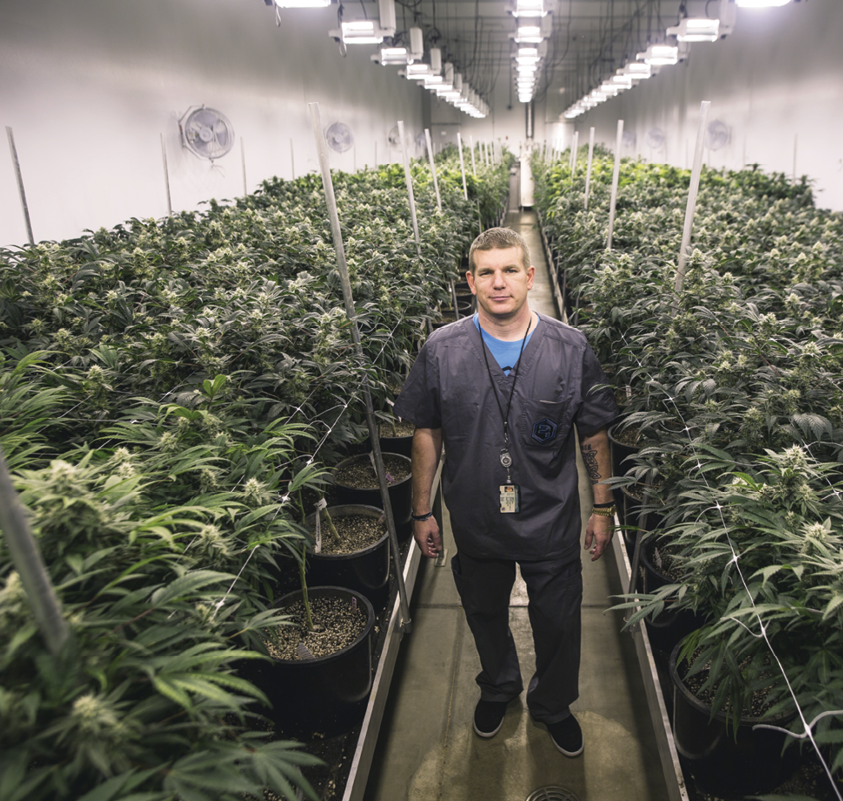- Continue Shopping
- Your Cart is Empty
Community-Centered Cannabis

When states implement new marijuana programs, and license applications begin to be filled out, there is usually a scramble for real estate in densely populated metropolitan areas. Hopeful cultivators may even try to outbid one another to get the largest warehouses in the best neighborhoods.
But not Tim McGraw, founder of Illinois medical cannabis producer Revolution Enterprises.
Instead of trying to join the bidding wars in larger cities when Illinois legalized medical cannabis in January 2013, McGraw started making cold calls to rural towns in need of an economic stimulus.
“A lot of cannabis companies,” McGraw says, “find a location, and then try to convince, so to speak, the community to accept them and get the support. We did the opposite: We worked backwards into the location, by finding communities that wanted us.”
That seemingly counter-intuitive approach paid off for Revolution Enterprises. It was awarded two of the state’s 19 cultivation licenses: one for a facility in Barry, and another dedicated to the company’s flagship facility in Delavan.
“[Being in smaller communities], was, I think, a huge differentiator between us and the other applicants,” McGraw says.
Now, at the tail end of 2016, those licenses have turned into two 75,000-square-foot facilities and Revolution Enterprises is eyeing new markets in which to expand. McGraw, however, is still focused on making sure the small towns aren’t left in the dust of his big plans.
Being Part of the Community
On the night of July 16, an EF2 tornado touched down in Delavan. Wind gusts of 120 mph leveled 51 homes on a 1.3-mile-long path of destruction, leaving one Delavanite seriously injured.
Revolution Enterprises’ facility in the town was still under construction when the tornado hit, but no damage was done to the structure. So what McGraw did next came as a surprise to the entire town.
“I talked to the mayor at 5:00 in the morning, a few hours after the tornado hit, and just said, ‘What can we do to help? Do you need help with cleanup? Do you need bodies? What do you need?’” McGraw says. “And she said, ‘You know, Tim, we just need places for people to stay.’”
So that’s what Revolution Enterprises provided by footing the hotel bills for those families who saw their homes destroyed. McGraw also bought storm detectors for any household in town that wanted one. That way, he explains, Delavan’s residents could have more time to prepare their homes if another tornado approached the town.
His reasoning behind those decisions is simple. “I saw the devastation in this small town … so that’s just being a good neighbor, you know?”
McGraw made a point to set up shop in smaller communities rather than in larger, urban areas. Not only is Revolution Enterprises making a bigger impact in the community, but areas in need of economic development often will be willing to work with businesses, more so than cities like Chicago, McGraw says.
“Before construction, the towns were [ghost towns],” McGraw explains. “There’s maybe one person for lunch at the local restaurant, where now there’s 60-plus employees down the street, filling up the restaurants for lunch, and then going out for a drink after work.”
And the towns have shown their appreciation in return.
When McGraw tried to winterize his Barry site while it was still under construction, his crew was struggling to place a tarp over the construction site with 40 mph winds blowing it away at every try. Locals volunteered their time and supplies to help, laying down bails of hay and old tires to keep the tarp from flying off. A lab technician holds up a round-bottom flask filled with cannabis extract. The flask is also called a “dragonball” due to its resemblance to the popular Japanese manga object.
A lab technician holds up a round-bottom flask filled with cannabis extract. The flask is also called a “dragonball” due to its resemblance to the popular Japanese manga object.
“That stuff doesn’t happen in the city,” McGraw says. “You don’t get the locals reaching out and saying, ‘Oh, how can we help?’”
McGraw also credits the support Revolution Enterprises has received from these small communities as the reason the group became operational so quickly after receiving its licenses.
“Not only did it help with the applications, but it helped us in meeting the requirement of being operational within six months. We built two 75,000 square feet of the most advanced cannabis facilities in the world, and we did it in four and a half months,” he says.
Advancing the Science
And advanced his facilities are, although you wouldn’t think so when you look at them from the outside.
A 12-foot-high barbed-wired fence surrounds an otherwise plain, green and beige sheet-metal building. How to cross that fence is just the first feature of Revolution Enterprises’ facilities.
“To get in …, you need to check in,” explains Eric Diekhoff, general manager for Revolution Enterprises – Delavan, where he oversees day-to-day operations. “If you’re an employee, you have a card that you scan, and it has a personalized PIN you need to enter to get into the gate.”
If you’re a visitor, you need to speak to and check in with the facility’s on-duty security guard in a “man-trap” room before being escorted to whom you need to meet.
These security measures and features are all put into place to secure the approximately $17 million investment the company put into each of the facilities. Delavan is especially valuable to McGraw’s group as it houses all of Revolution Enterprises’ research and development labs, in-house testing rooms, and extraction labs, where it creates everything from CO2 oil to live resin, shatter, sap and moonrocks, among other products.
Research and development plays a large role in Revolution Enterprises’ business plans. The laboratories resemble more of what you might find in a pharmaceutical setting rather than a typical cultivation business. Lab technicians and researchers experiment with phenotypes to discover which cultivars produce the highest yield in the facilities’ conditions, new extraction products are developed and tested, and growers breed new cultivars to address different patient needs.
“The whole purpose of building these facilities to the specs that we did was to build laboratories that are dedicated to advancing the science of cannabis,” McGraw explains. “We’re not just here to pump out flower and make money.”
Despite his background in real estate development (both commercial and industrial), the learning curve in designing the facilities was still steep for McGraw. He says that is primarily because most engineers have not built cannabis facilities like these before.
“Every room within the facility is its own unique environment – the CO2 levels, the humidity, the temperature, all of that – depending on what strain or what you’re doing in each one of those rooms, or whether it’s flower, or veg, or whether you’re growing a sativa or an indica,” he explains.
Using environmental controls by Automated Logic, McGraw can control the HVAC for every room in either of his facilities directly from his phone. (“Not that I would touch it, because I’d mess it up,” he laughs.)
That system also helps avoid spikes in the rooms’ environments, says Revolution Enterprises COO Dustin Shroyer. It does so by enabling controllers to program levels “to the second instead of down to a 15-minute increment or waiting for a spike for our [HVAC] to kick on. We really don’t have spikes in cooling or heating or humidity.”









